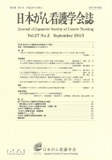Japanese
English
- 販売していません
- Abstract 文献概要
- 参考文献 Reference
- サイト内被引用 Cited by
要旨
目的:本研究の目的は,ホルモン治療中の乳がん女性の苦痛と対処を明らかにし,その看護を考察することである.
方法:外来通院にてホルモン治療中の50歳未満の乳がん女性7名を対象に,グラウンデッドセオリーアプローチを参考に質的帰納的研究を行った.半構成的面接の逐語録をデータとし,質的研究者のスーパーバイズのもと分析した.
結果:苦痛は7つの大カテゴリー[生活に支障をきたすつらい症状][コントロールできない気分の不安定さ][自分に対する自信の低下][今までとの違いによる混乱][治療継続に対する葛藤][周囲からの孤立感][自分で対応することへの不安]を抽出した.乳がん女性は治療の副作用や混乱,孤立感などを感じており,コアカテゴリーは『つらい症状とコントロール感低下に伴う混乱』とした.対処は6つの大カテゴリー[体と向き合い生活を再構築する][軌道修正しつつ状況に対応する][周囲のサポートを実感する][信じて気持ちを保つ][あがかないようにしてエネルギーを保つ][見通しをもって事前に備える]を抽出した.心の支えを得ながら苦痛に臨機応変に対応しており,コアカテゴリーは『心の支えをもち軌道修正しつつ状況に対応する』とした.
結論:ホルモン治療中の乳がん女性は,治療の副作用とともにサバイバーとして自分の生活や社会環境に適応する過程で生じる混乱や孤立感などに苦痛を抱いていた.それらの苦痛に対して,心の支えを得ながら臨機応変に対応していた.
Abstract
Purpose: The purpose of this research is to clarify the distress and coping strategies of women with breast cancer who are undergoing hormone therapy, and to consider their care.
Method: The participants were 7 women under the age of 50 with breast cancer who were undergoing hormone therapy on an outpatient basis. Verbatim recordings from semi-structured interviews were utilized as data and analyzed under the supervision of a qualitative researcher, while drawing on the Grounded Theory Approach.
Results: The following 7 categories of distress were extracted: "painful symptoms that interfere with living", "uncontrollable emotional instability", "reduced self-confidence", "agitation over differences between the present and past", "conflict concerning continuing treatment", "a sense of social isolation" and "anxiety over being able to cope on one's own". Since women with breast cancer suffer side effects from treatment and also feel agitated and a sense of isolation, the core category was established as "agitation caused by painful symptoms and a reduced sense of control". The following 6 categories of coping strategies were extracted: "rebuilding a lifestyle that comes to terms with my condition", "coping while making changes to the road to progress", "surrounding myself with supportive people", "maintaining a feeling of conviction and keeping up my spirits", "sustaining energy to avoid struggling" and "having a vision of the future and making preparations in advance". Since the women adapt to distressful circumstances while gaining emotional support, the core category was established as "receiving emotional support and coping while altering the path to progress".
Conclusions: Women with breast cancer who are receiving hormone therapy experience not only the side effects of treatment, but as survivors, they also experience distress caused by the agitation and sense of isolation derived from the process of adapting to their lifestyles and social environment. They cope with this distress by adapting and receiving emotional support.
Copyright © 2013, Japanese Society of Cancer Nursing All rights reserved.


